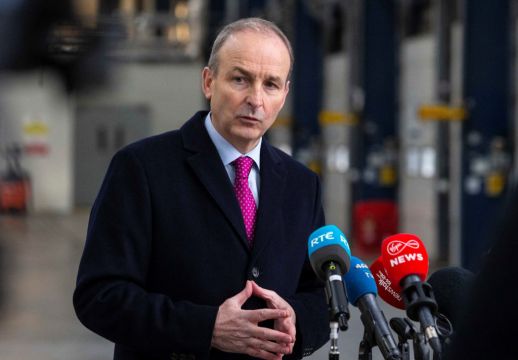Additional reporting from Vivienne Clarke
The Government will soon clarify if the country can begin reopening next month, the Taoiseach said on Tuesday.
Micheál Martin cautioned a cautious approach will be taken, as Covid-19 figures remain high with upwards of 1,000 cases confirmed each day.
As it stands, current Level 5 restrictions are due to continue until at least March 5th.
Speaking on his way into Cabinet this morning, Mr Martin said: “We’ll bring greater clarity to that towards the middle of this month but bear in mind that we will be conservative and cautious in terms of any reopening.
“The objective is prolonged suppression of the virus, to get the numbers down very low, and to keep them low.”
On Monday, the Minister for Housing confirmed that construction sites will be allowed to reopen on March 5th.
However, Mr Martin has previously said it is unlikely that there will be any significant easing of Covid-19 restrictions in early March.
Minister for Justice Helen McEntee has said that it would be important to take into account Covid trends when making plans to ease Level 5 restrictions.
The Government has already commenced work on how restrictions will be lifted or eased, she told RTÉ radio’s News at One.
“We need to get people back to work, in a safe and gradual way.”
Ms McEntee said the Government wanted to see a phased reopening of schools and that special classes and schools will reopen this month.
In the meantime it was important to “get it right” with regard to quarantine restrictions for people arriving into the country. Ireland was engaging with UK and Northern Ireland officials, providing information on people arriving into the country who were then travelling onto the UK and Northern Ireland. Passenger Location forms were being shared, she said.
Plans to introduce mandatory quarantine in specific locations were at an advanced stage, “we’re talking about a matter of weeks. There was a procurement process, identifying hotels, it was not just a case of introducing legislation, she explained.
“That information is being provided to the UK and they then are able apply measures on their side.
“It's not obviously straight forward, this is not something that we've done before, we're doing this on health grounds and it's important that we get this right.”
New travel restrictions
Also speaking on Tuesday morning, the Transport Minister said further travel restrictions will be introduced to aid suppression of the virus in Ireland.
At present, passengers must provide proof of a negative PCR test taken 72 hours before arriving into the State, while those arriving from variant hotspots of South Africa and Brazil must quarantine for two weeks in a designated facility.
Eamon Ryan said this will extend to other countries in time.
“I think we’re going to do more extensive restrictions on travel, including quarantine for other countries other than Brazil and South Africa,” he said.
“But I think we need to get the system up and running, we need to get the hotels working, and then we can extend.”
It comes after new figures showed that the majority of the 110,930 passengers who passed through Dublin Airport in January were travelling for non-essential reasons.

On Monday evening, the National Public Health Emergency Team (Nphet) reported “steady progress” against all indicators of the disease, with the latest figures showing 829 new cases and six deaths.
Professor Philip Nolan, chairman of Nphet's epidemiological modelling advisory group, said Ireland remains on track to record 200 to 400 cases a day by the end of February if the effort to stay home continues.
Ireland has passed the worst of the Covid-19 pandemic this year, the country’s deputy Chief Medical Officer said.
Dr Ronan Glynn said he was hopeful the nation would not have to experience what happened in January again, when the country’s third surge of infection saw more cases confirmed than in all of 2020.







